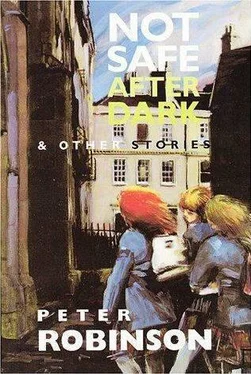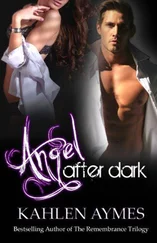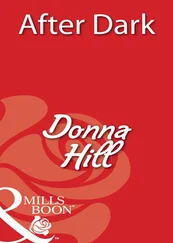And, lastly, I thought of Evelyn. Life just isn’t fair, is it? Some people don’t simply fade away quietly into the obscurity from whence they came when you want rid of them, do they? No, they have to cause trouble, create scenes, make unreasonable demands and generally do their damnedest to ruin your hopes of a decent and happy future without them. They just won’t go away . Well, as I have already explained, Evelyn is one of those people. I’m certain of it.
On the other hand, people disappear all the time, don’t they? And people change. Harriet changed into Joyce, didn’t she? Sometimes you just have to give a little kick-start to get the process going, like the carrion in the septic tank, and then nature takes care of the rest.
‘Penny for them?’
‘What? Oh, I’m sorry, Sam. Miles away.’
‘That’s all right. I was just saying as how you’ll need some carrion for the septic tank. My old boss swore by it, he did.’
At that moment, Evelyn passed by the open French windows in his shabby beige cardigan, secateurs in hand. Wisps of grey hair blew in the March wind like spiders’ webs, and his glasses had slipped down his nose. Yes, people disappear all the time, don’t they? And if it can happen to wives, I thought, then it can bloody well happen to husbands too.
‘Yes, Sam,’ I said slowly. ‘Yes, I suppose we will. Don’t worry. I’ll take care of it.’
The girl sittingoutside the cafe reminds me of April. She has the same long hennaed hair, which she winds around her index finger in the same abstracted way. She is waiting for someone clearly – a lover perhaps – and as she waits she smokes, holding her cigarette in the same way, taking the same short, hurried puffs, that April used to do. With her free hand, she alternates between taking sips of milky pastis and tapping her cigarette packet on the table. She is smoking Marlboro, as everyone in Paris seems to do these days. Back then it was all Gitanes, Gauloises and Disque Bleus.
Still, it wasn’t smoking that killed April; it was love.
•
It is late September, and though the weather is mild, it is still too cold outside for an old man like me, with blood as thin and as lacking in nutrients as workhouse gruel. Instead, I sit inside the little cafe on the Boulevard St Germain over a pichet of red wine, just watching the people come and go. The young people. I have spent most of my life surrounded by the young, and though I grow inexorably older every year, they always seem to stay young. Immortal youth . Like Tithonus, I am ‘a white-haired shadow roaming like a dream’. But unlike Tennyson’s luckless narrator, who gained eternal life but not eternal youth, I am not immortal.
Six months, perhaps less, the doctors say. Something is growing inside me; my cells are mutating. As yet I feel little pain, though my appetite has diminished and I often suffer from extreme weariness.
Dying, I find, lends an edge to living, gives a clarity and a special, golden hue to the quotidian scenes parading before me: a swarthy man with a briefcase, glancing at his watch, speeding up, late for an important appointment; a woman chastising her little girl at the corner, wagging her finger, the girl crying and stamping her foot; a distracted priest stumbling briefly as he walks up the steps to the church across the boulevard.
Dying accentuates the beauty of the young, sets their energy in relief, enhances the smooth glow of their unwrinkled skin. But dying does not make me bitter. I am resigned to my fate; I have come to the end of my threescore and ten; I have seen enough. If you wish to travel, my doctors told me, do it now while you’re still strong enough. So here I am, revisiting the scene of my one and only great amour .
April . She always pronounced it Ap-reel . When I think of her, I still hear Thelonious Monk playing ‘April in Paris’, hesitantly at first, feeling his way into the song, reluctant to define the theme, then worrying away at it and, once finding it, altering it so much that the music becomes his own, only to be abandoned finally.
Of course, April didn’t give a tinker’s for Thelonious Monk. She listened to him dutifully, as they all did, for they were the heirs of Kerouac, Ginsberg and Burroughs, to whom Monk, Bird, Trane, Miles and Mingus were gods, sacred and cool. But April’s generation had its own gods – the Doors, Cream, Jimi Hendrix, Bob Dylan – gods of words and images as well as of music, and it was they who provided the soundtrack to which I lived during my year as a visiting lecturer in American literature at the Sorbonne in 1968.
This cafe hasn’t changed much. A lick of paint, perhaps, if that. It probably hasn’t changed much since Hemingway and Fitzgerald used to hang out around here. Even the waiters are probably the same. It was here I first met April, of course (why else would I come here?), one fine evening towards the end of March that year, when I was still young enough to bear the slight chill of a clear spring evening.
•
That April was beautiful almost goes without saying. I remember her high cheekbones, her smooth, olive complexion, dark, watchful eyes and rich, moist lips, down-turned at the edges, often making her look sulky or petulant when she was far from it. I remember also how she used to move with grace and confidence when she remembered, but how the gaucheness of late adolescence turned her movements into a country girl’s gait when she was at her most unselfconscious. She was tall, slim and long-legged, and her breasts were small, round and high. The breasts of a Cranach nude.
We met, as I say, one late March evening in 1968 at this cafe, the Café de la Lune, where I was then sitting with the usual group: Henri, Nadine, Brad, Brigitte, Alain and Paul. This was only days after Daniel Cohn-Bendit and seven other students had occupied the dean’s office at Nanterre to protest against the recent arrest of six members of the National Vietnam Committee, an event that was to have cataclysmic effects on us all not long afterwards. Much of the time in those days we spoke of revolution, but that evening we were discussing, I remember quite clearly, F. Scott Fitzgerald’s Tender Is the Night, when in she walked, wearing a woolly jumper and close-fitting, bell-bottomed jeans with flowers embroidered around the bells. She was carrying a bulky leather shoulder bag, looking radiant and slightly lost, glancing around for someone she knew.
It turned out that she knew Brad, an American backpacker who had attached himself to our group. People like Brad had a sort of fringe, outlaw attraction for the students. They seemed, with their freedom to roam and their contempt for rules and authority, to embody the very principles that the students themselves, with their heavy workloads, exams and future careers, could only imagine, or live vicariously. There were always one or two Brads around. Some dealt in drugs to make a living; Brad, though he spoke a good revolution, lived on a generous allowance wired regularly by his wealthy Boston parents via Western Union.
April went up to Brad and kissed him on both cheeks, a formal French gesture he seemed to accept with thinly veiled amusement. In his turn, Brad introduced her to the rest of us. That done, we resumed our discussion over another bottle of wine, the tang of Gauloises and café noir infusing the chill night air, and April surprised me by demonstrating that she had not only read Tender Is the Night , but that she had thought about it, too, even though she was a student of history, not of literature.
‘Don’t you think those poor young girls are terribly used ?’ she said. ‘I mean, Nicole is Dick’s patient. He should be healing her, not sleeping with her. And the way Rosemary is manipulated by her mother… I’d go so far as to say that the mother seems to be pimping for her. Those films she made -’ and here April gave her characteristic shrug, no more than a little shiver rippling across her shoulders – ‘they were no doubt made to appeal to older men.’ She didn’t look at me as she said this, but my cheeks burned nonetheless.
Читать дальше










![Джеймс Чейз - Not Safe to Be Free [= The Case of the Strangled Starlet]](/books/417649/dzhejms-chejz-not-safe-to-be-free-the-case-of-the-thumb.webp)

